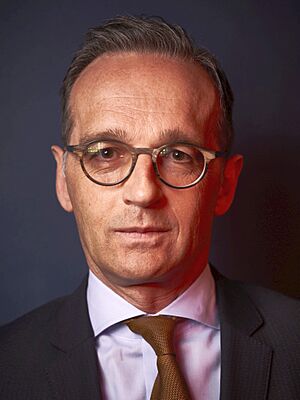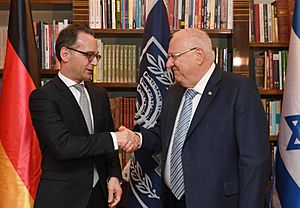Heiko Maas facts for kids
Quick facts for kids
Heiko Maas
|
|||||||||||||||||||||||||||||||||||||||||||
|---|---|---|---|---|---|---|---|---|---|---|---|---|---|---|---|---|---|---|---|---|---|---|---|---|---|---|---|---|---|---|---|---|---|---|---|---|---|---|---|---|---|---|---|

Maas in 2019
|
|||||||||||||||||||||||||||||||||||||||||||
| Federal Minister of Foreign Affairs | |||||||||||||||||||||||||||||||||||||||||||
| In office 14 March 2018 – 8 December 2021 |
|||||||||||||||||||||||||||||||||||||||||||
| Chancellor | Angela Merkel | ||||||||||||||||||||||||||||||||||||||||||
| Preceded by | Sigmar Gabriel | ||||||||||||||||||||||||||||||||||||||||||
| Succeeded by | Annalena Baerbock | ||||||||||||||||||||||||||||||||||||||||||
| President of the Committee of Ministers of the Council of Europe | |||||||||||||||||||||||||||||||||||||||||||
| In office 18 November 2020 – 21 May 2021 |
|||||||||||||||||||||||||||||||||||||||||||
| Preceded by | Nikos Dendias | ||||||||||||||||||||||||||||||||||||||||||
| Succeeded by | Péter Szijjártó | ||||||||||||||||||||||||||||||||||||||||||
| Federal Minister of Justice and Consumer Protection | |||||||||||||||||||||||||||||||||||||||||||
| In office 17 December 2013 – 14 March 2018 |
|||||||||||||||||||||||||||||||||||||||||||
| Chancellor | Angela Merkel | ||||||||||||||||||||||||||||||||||||||||||
| Preceded by | Sabine Leutheusser- Schnarrenberger (Justice) Ilse Aigner (Consumer Protection) |
||||||||||||||||||||||||||||||||||||||||||
| Succeeded by | Katarina Barley | ||||||||||||||||||||||||||||||||||||||||||
|
|||||||||||||||||||||||||||||||||||||||||||
| Member of the Bundestag for Saarland |
|||||||||||||||||||||||||||||||||||||||||||
| In office 26 October 2021 – 16 December 2022 |
|||||||||||||||||||||||||||||||||||||||||||
| Preceded by | Peter Altmaier | ||||||||||||||||||||||||||||||||||||||||||
| Succeeded by | Emily Vontz | ||||||||||||||||||||||||||||||||||||||||||
| Constituency | Saarlouis | ||||||||||||||||||||||||||||||||||||||||||
| In office 24 September 2017 – 26 October 2021 |
|||||||||||||||||||||||||||||||||||||||||||
| Constituency | SPD state-wide list | ||||||||||||||||||||||||||||||||||||||||||
| Member of the Landtag of Saarland | |||||||||||||||||||||||||||||||||||||||||||
| In office 16 October 1994 – 17 December 2013 |
|||||||||||||||||||||||||||||||||||||||||||
| Personal details | |||||||||||||||||||||||||||||||||||||||||||
| Born |
Heiko Josef Maas
19 September 1966 Saarlouis, West Germany (present-day Germany) |
||||||||||||||||||||||||||||||||||||||||||
| Political party | Social Democratic Party | ||||||||||||||||||||||||||||||||||||||||||
| Domestic partner | Natalia Wörner | ||||||||||||||||||||||||||||||||||||||||||
| Alma mater | Saarland University | ||||||||||||||||||||||||||||||||||||||||||
Heiko Josef Maas (born 19 September 1966) is a German lawyer and former politician. He was a member of the Social Democratic Party (SPD). He served as Germany's Federal Minister of Foreign Affairs from 2018 to 2021. Before that, he was the Federal Minister of Justice and Consumer Protection from 2013 to 2018. Both roles were in the government led by Chancellor Angela Merkel.
Maas was born in Saarlouis, a city in the German state of Saarland. Before working for the national government, he was a politician in Saarland. There, he served as a minister in the state government. Since leaving politics in 2022, he has been working as a lawyer.
Contents
Early Life and Education
Heiko Maas was born in Saarlouis, Germany, on September 19, 1966. His father was a soldier who later worked at a Ford car factory, and his mother was a dressmaker. After finishing high school in 1987, he served in the military for a year.
In 1989, Maas began studying law at Saarland University. He finished his studies and became a qualified lawyer in 1996.
Political Career
Working in State Politics
Maas began his political career in the parliament of his home state, Saarland, in 1994. He held several important jobs there. From 1998 to 1999, he was the Minister of the Environment, Energy and Transport.
Later, from 2012 to 2013, he was the Deputy Minister-President of Saarland. He was also in charge of the economy, labor, energy, and transport.
Working in National Politics
After the 2013 German national election, Maas became a minister in the federal government. On December 17, 2013, he became the Minister of Justice and Consumer Protection. In this role, he was responsible for Germany's laws and for protecting the rights of shoppers and consumers.
Because he proposed many new laws, a major German newspaper called him the 'Prohibition Minister'. During his time as a minister, he faced strong opposition to some of his policies.
Federal Minister of Foreign Affairs
In 2018, Maas became the Federal Minister of Foreign Affairs. This meant he was Germany's top diplomat, responsible for relationships with other countries.
One famous moment was at the United Nations in 2018. The U.S. President at the time, Donald Trump, said Germany depended too much on Russian energy. Maas and others were seen smiling at this comment. Maas later told reporters that Germany was not dependent on Russia.
Life After Politics
In December 2022, Maas left the German parliament, the Bundestag, and retired from politics. He returned to his career as a lawyer. In 2023, he also became the president of a group that represents the steel industry in his home state of Saarland.
Political Positions
As a politician, Heiko Maas had views on many different issues, from how Germany should act in the world to rules for the internet.
Foreign Policy

As foreign minister, Maas was often firm in his dealings with other countries, especially Russia. He supported German soldiers taking part in United Nations peacekeeping missions in Africa.
Maas also had strong opinions on world events:
- China: He raised concerns about the treatment of the Uyghur people in camps in Xinjiang.
- Yemen: He called the civil war in Yemen a "humanitarian tragedy" and supported calls for a ceasefire.
- Iran: He worked to keep the Iran Nuclear Deal alive to prevent Iran from building nuclear weapons.
- Turkey: He warned against a Turkish military operation in Syria in 2019. He also urged for calm in a dispute between Turkey and Greece over the Aegean Sea.
Digital Policy
Maas was very involved in making rules for the internet. He believed that large tech companies like Google had too much power. He also felt that Facebook's rules for protecting user data were not clear enough.
Law Against Hate Speech
In 2017, Maas introduced a law called the "Netzwerkdurchsetzungsgesetz" (or "NetzDG"). This law was created to fight hate speech and fake news on social media. It requires platforms like Facebook and Twitter to remove illegal content quickly. If they don't, they can be fined millions of euros.
Some people criticized the law. They worried it would make companies delete too much content to avoid fines, which could harm freedom of expression.
Government Surveillance
In 2017, Maas supported a law that allowed the government to use special software to search computers in certain criminal investigations. This was controversial. Critics said the law was a threat to privacy and computer security.
Personal Life
Maas was married to Corinna Maas from 2000 to 2018, and they have two sons. For several years, he was in a relationship with actress Natalia Wörner. They announced their separation in 2023. Since late 2023, he has been back together with his former wife, Corinna.
Maas is a fan of football and supports the team Hamburger SV. He also competes in triathlons, which are races that include swimming, cycling, and running.
Images for kids
-
Maas with Russian Foreign Minister Sergey Lavrov on 15 February 2019
-
Maas with Iranian Foreign Minister Mohammad Javad Zarif on 10 June 2019
See also
 In Spanish: Heiko Maas para niños
In Spanish: Heiko Maas para niños







